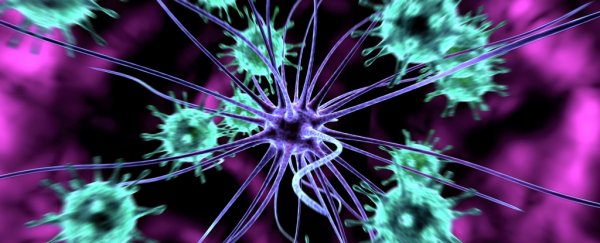Canadian Researchers Identify Immune Cells Called Tr1 That Helps Treat Pediatric Inflammatory Bowel Disease (IBD)
Source: Thailand Medical News Dec 11, 2019 6 years, 1 month, 1 week, 4 days, 3 hours, 30 minutes ago
Canadian researchers in a new study suggests that specialized immune cells that dampen inflammation and help repair the gut could be used as a potential therapy for children dealing with the painful symptoms of
inflammatory bowel disease (IBD).

A study by the BC Children's Hospital and the University of British Columbia shows that a specific type of T cell, called a
Tr1 cell, produces a chemical signal that helps repair the barrier formed by cells lining the gut and encourages the production of protective mucus.
This findings of the study was published in the December issue of
Gastroenterology.
Dr. Megan Levings, an investigator and head of the Childhood Disease Research Theme at BC Children's and a professor in UBC's department of surgery and school of biomedical engineering, senior author of the study told
Thailand Medical News, "This study offers new hope for kids with IBD who urgently need new treatments by showing that
Tr1 cells have the potential to reverse the damage caused by IBD. As a new therapy,
Tr1 cells could both suppress the inflammation that is ravaging the lining of the gut and help heal the tissue lining that keeps out harmful bacteria."
IBD or
inflammatory bowel disease occurs when the body's immune system mistakenly triggers inflammation in the digestive tract. Inflammation is part of the body's normal response to illness and injury, but in conditions like Crohn's and colitis it can severely damage healthy tissue.
Currently, more than 7,000 Canadian children have been diagnosed with IBD and deal with constant belly pain, cramps, diarrhea and vomiting. These symptoms can lead to malnutrition, weight loss and a lack of energy which can result in missed school days and less time for sports and hobbies. The incidence of two main kinds of
IBD ie Crohn's disease and ulcerative colitis, is increasing and diagnoses of Crohn's in Canadian kids under 10 have doubled since 1995.
Typically, the most common frontline therapy for IBD is the use of antibodies to block inflammation. However, as many as a third of IBD patients do not respond to this treatment and even if treatment is initially successful, the disease can flare up again later.
Dr. Ted Steiner, an infectious disease specialist, investigator at BC Children's and professor in UBC's department of medicine., the study’s co-author further added, "Kids with IBD develop abnormal immune responses to normal gut bacteria. Training our immune system to fight off infections and bad gut bacteria while maintaining normal relationships with the good bacteria is critical for the health of children with these diseases."
Dr. Bruce Vallance, an investigator at BC Children's, the CH.I.L.D. Foundation Chair in Pediatric
Gastroenterology and professor in UBC's department of pediatrics and co aouthor added, "We created self-organized, three-dimensional mini-guts in the lab that we could use to test how
gt;Tr1 cells interact with other cells in a more life-like setting. What we found was unexpected, that Tr1 cells can promote the mini-guts to release protective mucus and improve the local gut environment. No other types of T cell that we've studied can do this."
Significantly, the researchers found that Tr1 cells isolated from patients with IBD are just as capable of reducing inflammation as those derived from healthy individuals.
The study's lead author Dr. Laura Cook, a UBC postdoctoral fellow commented, "It's not yet clear why people with IBD develop disease if their Tr1 cells are intact, but it could be there are simply too few of these cells to stave off the inflammation. By isolating and boosting the number of these cells in the lab we could one day offer this as a new personalized treatment strategy for children with colitis or Crohn's disease."
More work is needed to see how these cells can be best nurtured in the lab to ensure that when they are given to children with IBD they will have the best possible chance of relieving the condition. In the future, growing these cells from a patient and then reintroducing them to the gut could be a new cell-based therapy for inflammatory bowel disease.
Reference : Laura Cook et al, Suppressive and Gut-Reparative Functions of Human Type 1 T Regulatory Cells, Gastroenterology (2019). DOI: 10.1053/j.gastro.2019.09.002 